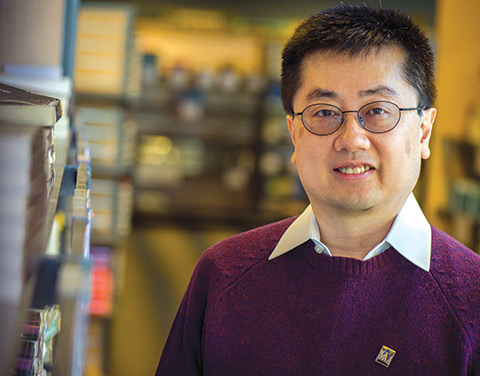Still, there are drawbacks to field research.
“In experimental research, the data is well-controlled, but you don’t know if it is valid outside the experiment,” Chen explains. “With field research, you can determine exactly what happened. But it is a challenge to account for all outside factors—like what a competitor is doing—because the subjects are not always being observed. Together, though, the two methods make a powerful combination.”
The Future of Business
College of Business Dean Rachel Croson says Chen’s work is at the forefront of behavioral economics, as it seeks to reveal what people actually do rather than what economic theory says they should do.
“Dr. Chen’s research provides economic insights that help companies think about how they should structure their firms, conduct their production processes, and run their forecasting,” she says. “It can help businesses reduce loss, set pricing, allocate resources, and thrive financially, making it increasingly valuable to small and large businesses that are turning to analytics to make sound decisions and avoid risk.”

Kay-Yut Chen's work tries to discover why people make the choices they do.
Prior to joining UT Arlington, Chen spent 20 years working for research labs at Yahoo and Hewlett-Packard, providing the companies with key analytics to improve decision-making at all levels, from entry to executive. At HP, he established the first-ever experimental economics laboratory inside a corporation.
Chen was drawn to academia because he wanted to explore broader research interests and teach a new generation of business leaders, but he still collaborates with the two companies. In one ongoing project with Yahoo, he’s examining the behavior of advertisers and developing a model to predict how and where everyone from small mom-and-pop businesses to international companies will spend their limited dollars.
For another, he’s creating a framework to predict the efficiency and success rate of Yahoo’s sales representatives based on their current workloads. The model, which will roll out later this year, will help the company prioritize projects, juggle workloads, and make trade-offs to help sales representatives meet targets. While this framework is highly customized for Yahoo, the technology could have applications for other institutions.
At Hewlett-Packard, executives asked Chen to test the idea of rewarding retailers for being among the top three in sales of HP products. Initially, the idea sounded like a positive way to drum up healthy competition. But Chen’s experiments showed two faults with the plan: First, most participants, playing the role of retailers, saw they had little chance to win and quickly gave up. Second, the sure winners had no incentive to improve their numbers since they were likely to earn the bonus anyway.
“Chen’s work is at the forefront of behavioral economics, as it seeks to reveal what people actually do rather than what economic theory says they should do.”
This phenomenon—when the results of behavioral studies defy conventional wisdom—happens frequently. For example, many in business assume customers will appreciate having more choices. However, numerous studies have shown the opposite is true. When presented with too much variety, people become paralyzed and walk away without making a purchase.
“That sort of knowledge has huge implications for businesses as they create marketing and work on product development,” Chen says. “Having this sort of information at their fingertips allows them to run more efficiently and more effectively.”
Chen’s work spans numerous business disciplines, from operations management to marketing, making it particularly attractive to corporations that need a holistic perspective. His research has been featured in Nature, Entrepreneur, The Wall Street Journal, Scientific American, and other influential publications.
As Dr. Croson notes, his long career in industry and background in economics will be a boon for UT Arlington.
“Dr. Chen’s research has produced tangible results for his employers and generated millions of dollars for the companies he worked for,” she says. “The experience and viewpoint he brings will be extremely valuable for our students.”
















